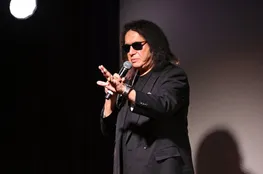Emmys odds are in Robert and Michelle King’s favor this season as the husband-and-wife duo have three shows in awards contention. The longtime series creators and executive producers behind Elsbeth , Evil and Happy Face , which are in the running, are no strangers to churning out multiple shows at a time. As Robert tells THR : “It was even harder when we were doing The Good Fight and Evil .” For the Kings, it’s not the volume of work that causes restless nights, it’s wanting to do more, particularly when it comes to their supernatural drama starring Katja Herbers, Mike Colter and Aasif Mandvi. “I don’t fucking understand why Evil was canceled; I still can’t,” Robert admits of the thriller that premiered on CBS in 2019 before moving to the network’s streaming platform Paramount+ in its second season. “I lay awake at night wondering why it was canceled, and it all seems to come back to the new streaming model, which is, ‘We have enough. We don’t need more. There’s no place for your show.’ ” “What can you say except that it was stupid,” Robert adds. “And I think the business is stupid.” Evil ran for four seasons before its series finale aired Aug. 22. Its pickup by Netflix sparked a new wave of audience interest, with the saga about a Catholic priest, a forensic psychologist and an atheist who investigate paranormal events landing in the streamer’s top 10 most watched shows during its final season.
Despite multiple Critics Choice, Writers and Make-Up and Hair Stylists Guild nominations, Evil has yet to land an Emmy nomination. “For a lot of TV writers, there’s an envy to be like movies, and I think Evil does that.” Evil is visually as dynamic as any show on TV. It was such a good marriage of so many crafts, both the monster creation and [cinematographer] Fred Murphy’s incredible photography; the real understanding of production design and how it impacts the moods of shows and so on; and then obviously the cast. It would be lovely if it got attention.” The character of Elsbeth Tascioni is another touchstone in the King universe that has seen multiple lives. The unconventional attorney originated 15 years ago on the legal drama The Good Wife and reappeared in the show’s spinoff The Good Fight before the Kings crafted the singularly focused Columbo -esque spinoff Elsbeth . Renewed for a third season in February, the procedural comedy drama sees the former Chicago lawyer working alongside the NYPD to catch criminals. “I don’t think we’d write Elsbeth past that first season if it weren’t for Carrie Preston,” says Robert of the actress who won the Emmy for outstanding guest actress in a drama series in 2013 for her portrayal on The Good Wife . If nominated for best actress, Preston would become the first performer to earn a nod in the lead category after previously winning as a guest actress for the same character. “There seemed to be a perfect marriage that I didn’t expect to work as well as it has,” he says, “and it’s because Carrie is willing to push comedy one to two notches higher than you think it will go.” Adds Michelle: “We’re drawn to characters who are underestimated, particularly women, and that’s the case here. Elsbeth is brilliant, but the fact that she’s also quirky and funny allows people to underestimate her.”
The Kings, also executive producers of the Bryan Cranston Showtime drama Your Honor , say they are drawn to stories about crime and murder — well, at least one King is. “It’s all Michelle. I would do Lassie if I could,” Robert jokes before Michelle steps in with an explanation: “I think stories with a real moral right and wrong, and being able to find the gray is interesting to us.” Enter Happy Face , the newest addition to the King canon, based on Melissa Moore’s 2018 podcast of the same name and her 2009 autobiography, Shattered Silence: The Untold Story of a Serial Killer’s Daughter . The adaptation, Michelle says, began with showrunner Jennifer Cacicio, who was one of the writers in the Kings’ Your Honor writers room. “There were a number of producers circling it, and the reason Melissa ultimately chose us is that Jen explained that she had a similar background,” she says. “While Jen’s father wasn’t a serial killer, he spent much of her childhood in prison on drug-dealing charges. They’re the same age, they both grew up in some poverty, so the fact that there was that deep connection allowed us to get involved because Jen was exactly the right writer for it.” Interjecting with a concern about the future of the TV business, Robert says, “One of the things you’re losing with not having writers rooms on shows is you’re losing writers that you’re going to take to the next project. I’m a little despairing of all this new talent that was brought in when there was a bubble — and it was a bubble; that’s the unfortunate thing. I’m just a little worried that they’ll get depressed and leave because there won’t be as many spots for them.” Explaining that Cacicio had been one of the eight writers in the room, Robert adds: “We love promoting from within, and not just because they’re good people or whatever, but because that’s where talent comes from. You give someone a chance, and I’m a little worried with where the business is going and all the shows that are written by one person, I don’t think people are getting their chance at bat. “By the way,” he continues, “this is not about having writers on the set, which I think is getting mixed up with everything. It’s about getting writers in the room. That is where education happens and producing education, too.”
With Happy Face , special care was given to the narrative, which follows Annalie Ashford’s Melissa Reed as she investigates a past murder of her father’s — serial killer Keith Jesperson, played by Dennis Quaid. “We deliberately did not use the names of the real victims,” explains Michelle. “We did not want to dishonor their families or make their families uncomfortable in that way, so that was fictionalized. But most of the past is real and most of the future is fictional.” That careful attention also carries through Quaid’s portrayal of Jesperson. “He was such a pro in the way he approached the character and wanting to make sure that the very fact that he’s a star doesn’t glamorize that behavior,” she adds. “I think all writers and showrunners deal with this issue. You make an anti-war movie, yet it glamorizes war.” One of the ways the writers sought to get around that conundrum was to tell the story from Melissa’s point of view. “There was this real sense of always having [Keith] be this dangerous thing in the corner of the frame who is really enjoying the glamour,” says Robert. “The very fact that the character was enticed with how his character as a serial killer was being portrayed on his daughter’s show mimicked what our show was doing, and that’s a good way to have the audience take one step back even more and go, ‘OK, that’s not glamorizing,’ because he’s even full of himself.”
Since 2009, the Kings have had a strong working relationship with CBS Studios, the network where their three shows, produced through King Size Productions, currently have a home. “There’s a lot of trust and honesty on both sides,” says Michelle, “and I don’t think you can count on that in every relationship in Hollywood — that we might agree, we might disagree, but it’s done with respect and transparency.” Adds Robert: “They let us go out on a limb creatively. Often you’re going on a limb, not sure how you’re going to get back. They’re people who kind of go out with you.” The dynamic somewhat mimics the one Robert and Michelle have with each other, with Michelle noting the level of trust they have between them as key to their longevity in Hollywood. “I don’t know how anyone does this job without a partner,” she says. “It’s a big job, so the fact that we’re able to split up a lot of the duties makes it manageable.” It also makes it more enjoyable, adds Robert. “One of the changes in the business is there is more business. There’s not as much creativity and there’s a little more talking about the shit, and that’s not as fun,” he says. “So, to have two people who can talk over the stuff that’s not fun is a tonic. You don’t lose your interest in the business.”
This story first appeared in a June stand-alone issue of The Hollywood Reporter magazine. To receive the magazine, click here to subscribe .”
























